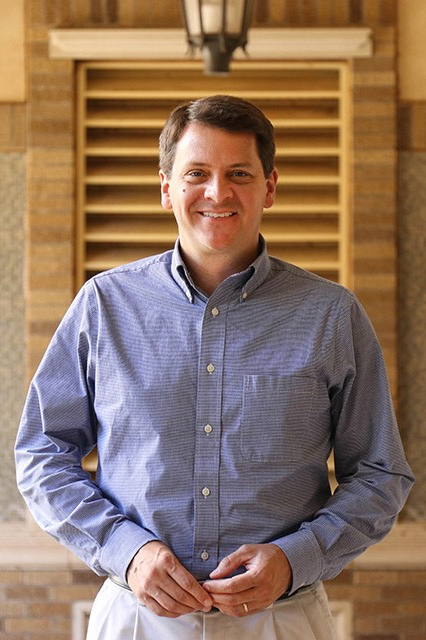English Professor's Invention Featured in Super Bowl Startup Competition
By: Glenys Young
A new technology developed at Texas Tech could be a game changer when it comes to diagnosing brain injuries in athletes.
The technology is EyeGuide Focus – a proprietary hardware and software platform that allows professionals to easily administer a simple, 10-second test to check for potential neurological impairment.
Focus was a finalist in the 1st and Future Super Bowl startup competition, which is designed to spur novel advancements in athlete safety and performance. The competition, in its third year, is sponsored by the NFL, Comcast NBCUniversal and the Mayo Clinic.
Brian Still, who chairs the Department of English, is the founder of the startup company called EyeGuide, Inc., which makes the product.
“I feel honored we were a finalist, but I think we're deserving,” Still said. “Focus works. Just last year we were featured on CNN because of Focus' effectiveness during two different MMA fights in 2017 where we tested fighters before and after fighting, and we published peer-reviewed research last year as well on previous data collected. We also presented at a Department of Defense brain health conference.
“At first glance, if you've never heard of what we've done, it would seem like an overnight success. But we've been building eye-tracking hardware and software for six-plus years and working to build and validate Focus for three of those years. We're honored and feel fortunate to have the opportunity, but we've also earned it. Focus is fast, reliable and affordable. We think it can be a game-changer.”

In 2011, EyeGuide spun off from Still's work in the Texas Tech Usability Research Lab, where he and his graduate students had invented the EyeGuide Tracker, a low-cost eye tracking system, and the EyeGuide Assist, which allows users with limited hand functionality to control a computer mouse with their eyes. EyeGuide then created a variety of software to optimize these systems.
Work on Focus began in late 2014. Prototype testing and data collection to validate its results lasted through 2015, and a limited release in 2016 and 2017 allowed the company to collect even more data.
“We made a lot of changes – to management, to hardware, to software – all along the way,” Still said. “It just takes a long time to get a device like this ready for commercial use.”
He now believes they're there.
“There's a lot of excitement and pressure to do well,” he said. “We understand this is the largest stage in terms of impact factor we've been on before. At the same time, we're ready.”
While Focus didn't win, the exposure of the Super Bowl competition is already having an impact on what Still calls the most important thing for any startup: fundraising.
“We make hardware, and we are making what will likely be a device that goes through some sort of FDA evaluation, and none of that is quick or cheap,” he said. “Exposure like this allows us to get the investor interest and money we need to get Focus made and into the hands of athletic trainers, coaches and physicians.
“I'll say it again: Focus works. You can use it on the sidelines or in the locker room, you can use it for any sport, it works for detection and recovery. It's a thermometer for the brain. It isn't the only solution, but it is a fast, reliable one that should go in the tool kit for concussion management. We've validated its effectiveness. I hope this competition – win or lose – allows us to get to market as soon as possible because this product will benefit those who end up using it.”
Still said his experience speaks volumes about the possibilities for research commercialization available through Texas Tech, which, he adds, have made tremendous strides since he began this journey seven years ago.
“An English professor with help from English graduate students first created an eye tracker, then created a company, then created a lot of innovative products, and now has created a product that detects concussions in 10 seconds,” he said. “From here, it really is possible.”
Discoveries
-
Address
Texas Tech University, 2500 Broadway, Box 41075 Lubbock, TX 79409 -
Phone
806.742.3905 -
Email
vpr.communications@ttu.edu
